Music
Trailers
DailyVideos
India
Pakistan
Afghanistan
Bangladesh
Srilanka
Nepal
Thailand
StockMarket
Business
Technology
Startup
Trending Videos
Coupons
Football
Search
Download App in Playstore
Download App
Best Collections
Technology
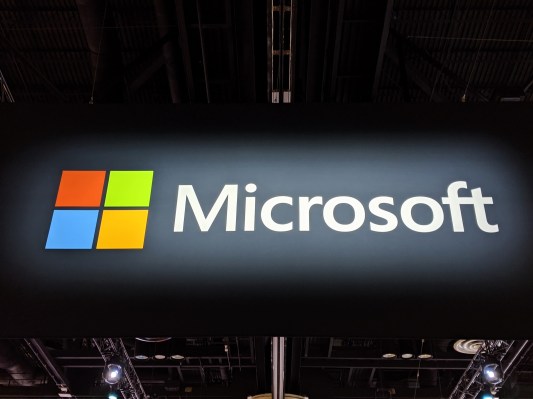
Following Microsoft lead from late last night, some the biggest technology companies in the U.S. have agreed to pay wages for hourly employees impacted by the ongoing corporate response to the coronavirus outbreak.
Itthe right thing for companies to do, from both a health and safety perspective, and to ensure that the hourly workers who are most impacted by work stoppages and shortages are not adversely affected by events that are beyond their control.
As we reported earlier today, Facebook committed to pay its &contingent& workers. And according to a report in Axios, Amazon, Google and Twitter are joining them. We&ve reached out to Apple but have yet to receive a comment.
In a statement to Axios, Amazon made the same commitment for its employees.
&We will continue to pay all hourly employees that support our campus in Seattle and Bellevue & from food service, to security guards to janitorial staff & during the time our employees are asked to work from home,& the company said in a statement. &In addition, we will subsidize one month of rent for the local small businesses that operate inside our owned buildings to help support them during this period.&
Google and Twitter have reportedly made the same commitments.
Tech companies have taken a lead on the issue and received praise from labor organizations for the stance. But organizers in the Bay Area and beyond are encouraging companies to cushion the blow hourly workers will face from lost wages due to office closures.
The issue has even caught the attention of the Democratic Senator Mark Warner from Virginia, who is pressuring gig economy companies Uber, Lyft, Postmates and DoorDash to provide compensation for workers impacted by the coronavirus.
&I strongly urge that you attempt to address the potential financial hardship for your workers if they are sick or have to self-quarantine during this time,& Warner wrote. &In order to limit the spread of COVID-19, it is critical that platform companies lead by example by committing that economic uncertainty will not be deterrents to their workers following public health guidance during the response.&
- Details
- Category: Technology Today
Read more: Big tech commits to paying wages for hourly employees affected by coronavirus plans
Write comment (93 Comments)SXSW has officially announced it will cancel its tech and music conference slated for March 13th to 22nd in Austin, Texas due to concerns around coronavirus, though itexploring rescheduling. &Based on the recommendation of our public health officer and our director of public health . . . I&ve gone ahead and declared a local disaster in the city and associated with that, have issued an order that effectively cancels SXSW,& said Austin Mayor Steve Adler at a press conference today.
SXSW writes that it will follow the mayororder and cancel its conference. &We are exploring options to reschedule the event and are working to provide a virtual SXSW online experience as soon as possible for 2020 participants, starting with SXSW EDU. For our registrants, clients, and participants we will be in touch as soon as possible and will publish an FAQ.& Itunclear if attendees or sponsors will receive refunds.
Interim health authority for Austin Dr. Mark Escott said that there are no confirmed cases of COVID-19 in Travis County, but called the cancellation a &proactive step in preparing this community for this storm.& He said that because people would be spending long periods of time near each other at panels and concerts, and because some registered attendees hail from international and domestic areas with COVID-19 exposure, cancelling SXSW was the right move. Not all future events will need to be cancelled, though, Escott explained.
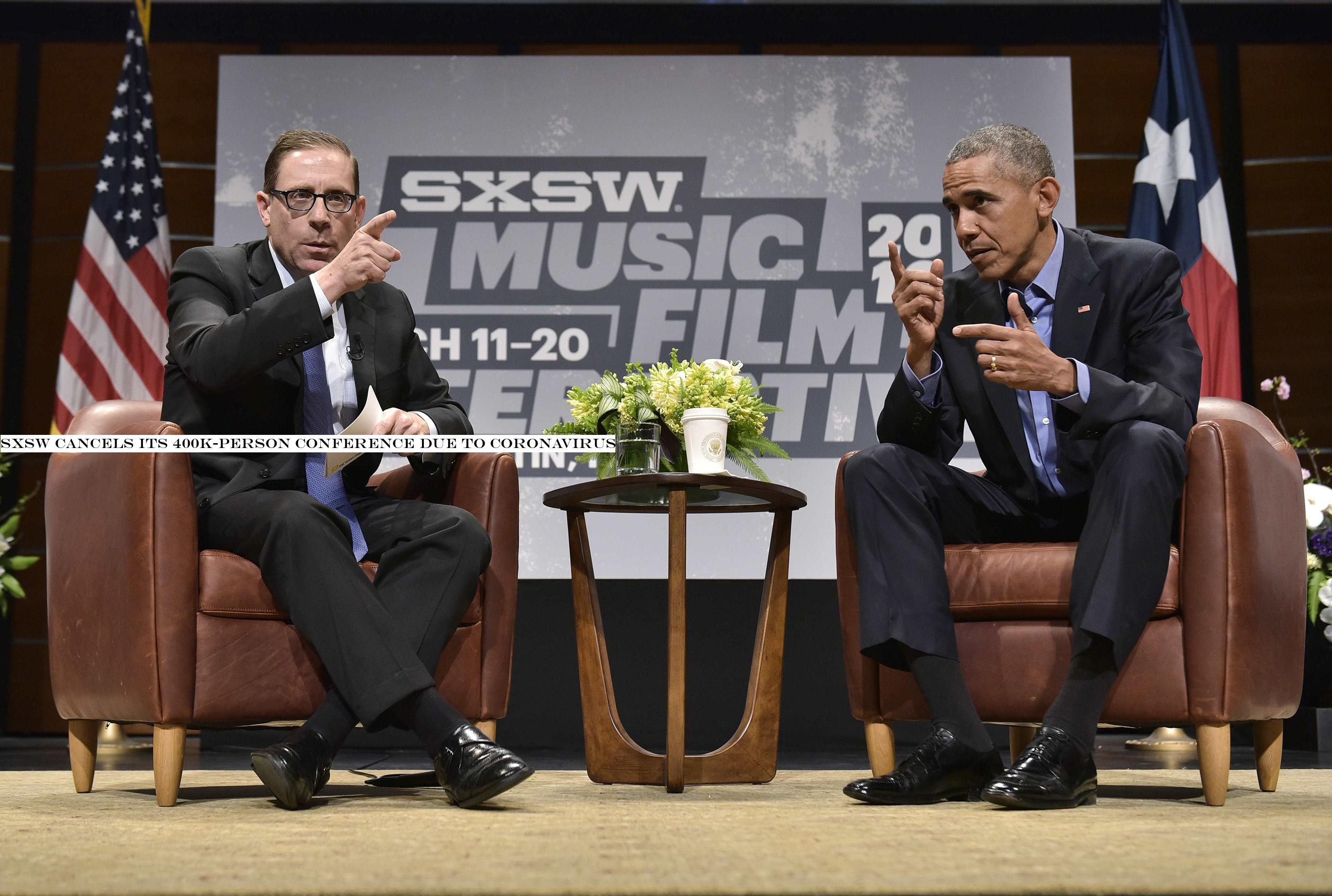
US President Barack Obama speaks during a South by Southwest Interactive with Texas Tribune editor Evan Smith (L) at the Long Center for Performing Arts in Austin, Texas on March 11, 2016. / AFP / MANDEL NGAN
The news comes just three days after Adler held a press conference to announce that, &At this point, thereno evidence that cancelling SXSW makes us safer.& As of Tuesday, AustinTravis County said Thursday that it had zero confirmed cases of COVID-19.
SXSW is known as a central gathering point for the tech, music and media industries that gather to learn from each other while enjoying the Texas weather, beer and barbecue. A decade ago it was the hot place to launch new social apps. Though over the years as the event grew less nerdy and more mainstream, SXSW became more of an exhibition space for well-funded companies to prove that they&re cool.
A petition to cancel the 2020 conference had reached 54,000 signatures. Entrepreneurship influencer Tim Ferris had called on Adler to cancel the event. SXSW had been refusing to offer refunds to trade show booth-buyers and attendees. A full-access platinum badge for the conference currently costs $1,550.
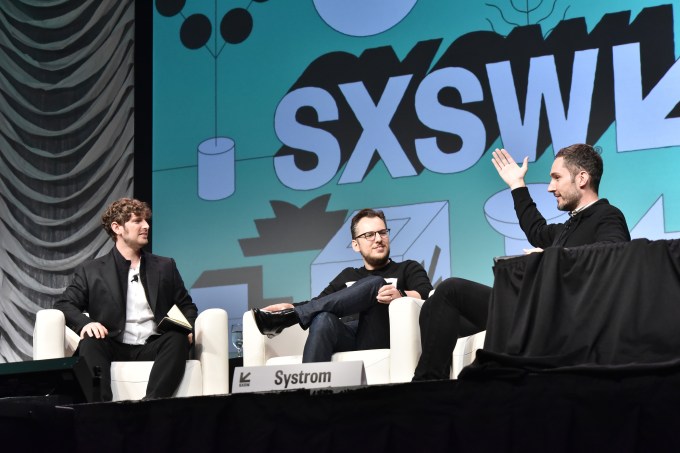
AUSTIN, TX & MARCH 11: Josh Constine, Mike Krieger and Kevin Systrom speak onstage at Interactive Keynote: Instagram founders Kevin Systrom - Mike Krieger with Josh Constine during the 2019 SXSW Conference and Festivals at Austin Convention Center on March 11, 2019 in Austin, Texas. (Photo by Chris Saucedo/Getty Images for SXSW)
The conference was put in a tough position by the pull-out of many of its highest-profile sponsors, speakers and party organizers. Netflix, Apple, Amazon, Twitter, Facebook, LinkedIn, Google, Vevo, TikTok, Warner/HBO and CNN had all cancelled events, product announcements, film premieres and speaking appearances by their employees.
Many other major tech conferences had already cancelled or moved online, including Google I/O, Facebook F8, GDC, Collision Toronto and Mobile World Congress. Music festivals like Ultra in Miami and Tomorrowland in Belgium had cancelled too. Lime president Joe Kraus was slated to hold a fireside chat with me at SXSW but had already cancelled this morning.
But the impact on Austin could be especially pronounced. SXSW isn&t a traditional festival held at one massive site. Itspread across hundreds of venues across the city that all run panels, parties and concerts simultaneously. For musicians in particular, expensive travel rearrangements and tight touring schedules could make cancellation of SXSW a serious burden on their businesses and something thattough to reschedule. The citybars, restaurants, venues and hotels that benefit from the hundreds of thousands of attendees could take a significant revenue hit, as well.
- Details
- Category: Technology Today
Read more: SXSW cancels its 400K-person conference due to coronavirus
Write comment (94 Comments)
Is it good news to say that stocks fell less sharply than they had on previous days?
Thatthe bright side of another turbulent trading day across the Nasdaq and New York Stock Exchange. The major indices were down again — although their declines were less severe than they had been during the week.
Investors appeared to shake off positive labor statistics (the U.S. added 273,000 jobs, ahead of expectations), as the expanding number of coronavirus cases in the U.S. and lack of a coordinated response from the Trump administration took their toll on investor confidence that the impact on the economy would be minimal.
With that said, things could have been worse.
The Dow fell 256.50 points, or just under 1%, to close at 25,864.78, while the S-P stumbled 51.57 points, or 1.7%, to close at 2,972.37 while the Nasdaq slid 1.8%, or 162.98 to close at 8,575.62. The benchmark indices are in the territory of a market correction — hovering at around a 10% loss already on the year.
For startups, itimportant to note that these market pressures can have implications for their businesses. Jittery buyers may be inclined to curb spending and save to conserve cash on their own balance sheets; consumers may rethink priorities and focus on essential purchases as they tighten their own belts.
Sequoia Capital warned in a blog post yesterday that things may change as time rolls along and the global economy stutters.
Heretheir take:
- Drop in business activity.Some companies have seen their growth rates drop sharply between December and February. Several companies that were on track are now at risk of missing their Q1 2020 plans as the effects of the virus ripple wider.
- Supply chain disruptions. The unprecedented lockdown in China is directly impacting global supply chains. Hardware, direct-to-consumer and retailing companies may need to find alternative suppliers. Pure software companies are less exposed to supply chain disruptions, but remain at risk due to cascading economic effects.
- Curtailment of travel and canceled meetings. Many companies have banned all &non-essential& travel and some have banned all international travel. While travel companies are directly impacted, all companies that depend on in-person meetings to conduct sales, business development or partnership discussions are being affected.
This isn&t the first time that one of the countrymost successful venture capital firms has warned its portfolio about the possibility of an economic crisis. In the wake of the 2008 financial crisis the firm issued an infamous slide deck warning &RIP Good Times.&
For financial markets the funeral bells are already tolling in the early part of the year. Now, a reckoning may be coming for startups that were on the edge of the bubble.
- Details
- Category: Technology Today
Read more: Stocks fall again on continued coronavirus worries
Write comment (90 Comments)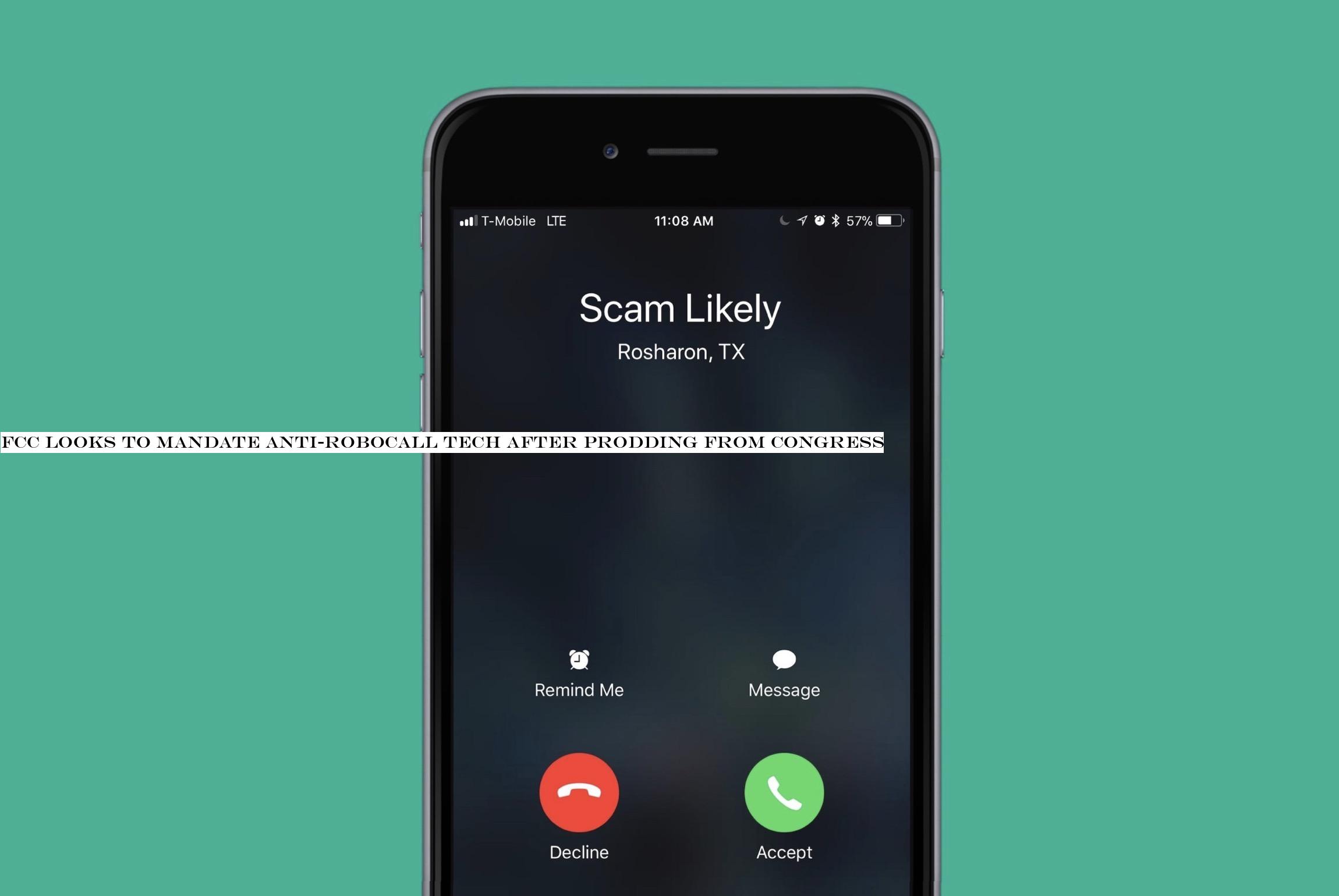
The FCC is finally going to require wireless carriers to implement an anti-robocalling technology, after asking them nicely for more than a year to do so at their convenience. Of course, the FCC itself is now required to do this after Congress got tired of waiting on them and took action itself.
The technology is called Secure Telephony Identity Revisited / Secure Handling of Asserted information using toKENs, mercifully abbreviated to STIR/SHAKEN, and amounts to a sort of certificate authority for calls that prevents phone numbers from being spoofed. (This is a good technical breakdown if you&re curious.)
STIR/SHAKEN has been talked about for quite some time as a major part of the fight against robocalls, and in 2018 FCC Chairman Ajit Pai said that carriers would have until the end of 2019 to implement it. 2019 came and went, and while the FCC (and indeed carriers) took other actions against robocallers, STIR/SHAKEN went largely undeployed.
Meanwhile, Congress, perhaps tired of receiving scam calls themselves, managed to collectively reach across the aisle and pass the TRACED Act, which essentially empowers the FCC and other departments to take action against robocallers — and prevents carriers from charging for anti-robocall services.
It also ordered the FCC to set a timeline for STIR/SHAKEN implementation, which is what Pai is doing now.
&Itclear that FCC action is needed to spur across-the-board deployment of this important technology. There is no silver bullet when it comes to eradicating robocalls, but this is a critical shot at the target,& he said in a statement issued today.
There does not, however, appear to be any great hurry. The proposal, which will be voted on at the FCCmeeting later this month, would require voice service providers to implement STIR/SHAKEN by June 30… of 2021. And one-year extensions will be available to smaller providers who claim difficulty getting the system up and running.
In other words, you can expect to keep receiving strange calls offering discounts on cruises and warning you of IRS penalties for some time to come. Of course, there are some things you can do to stem the flow of scammers — check out our 101 on preventing robocalls for some simple tips to save yourself some aggravation.
- Details
- Category: Technology Today
Read more: FCC looks to mandate anti-robocall tech after prodding from Congress
Write comment (91 Comments)Oribi, an Israeli startup promising to democratize web analytics, is now launching in the United States.
While we&ve written about a wide range of new or new-ish analytics companies, founder and CEO Iris Shoor said that most of them aren&t built for Oribicustomers.
&A lot of companies are more focused on the high end,& Shoor told me. &Usually these solutions are very much based on a lot of technical resources and integrations — these are the Mixpanels and Heap Analytics and Adobe Marketing Clouds.&
She said that Oribi, on the other hand, is designed for small and medium businesses that don&t have large technical teams: &They have digital marketing strategies that are worth a few hundred thousand dollars a month, they have very large activity, but they don&t have a team for it. And I would say that all of them are using Google Analytics.&
Shoor described Oribi as designed specifically &to compete with Google Analytics& by allowing everyone on the team to get the data they need without requiring developers to write new code for every event they want to track.
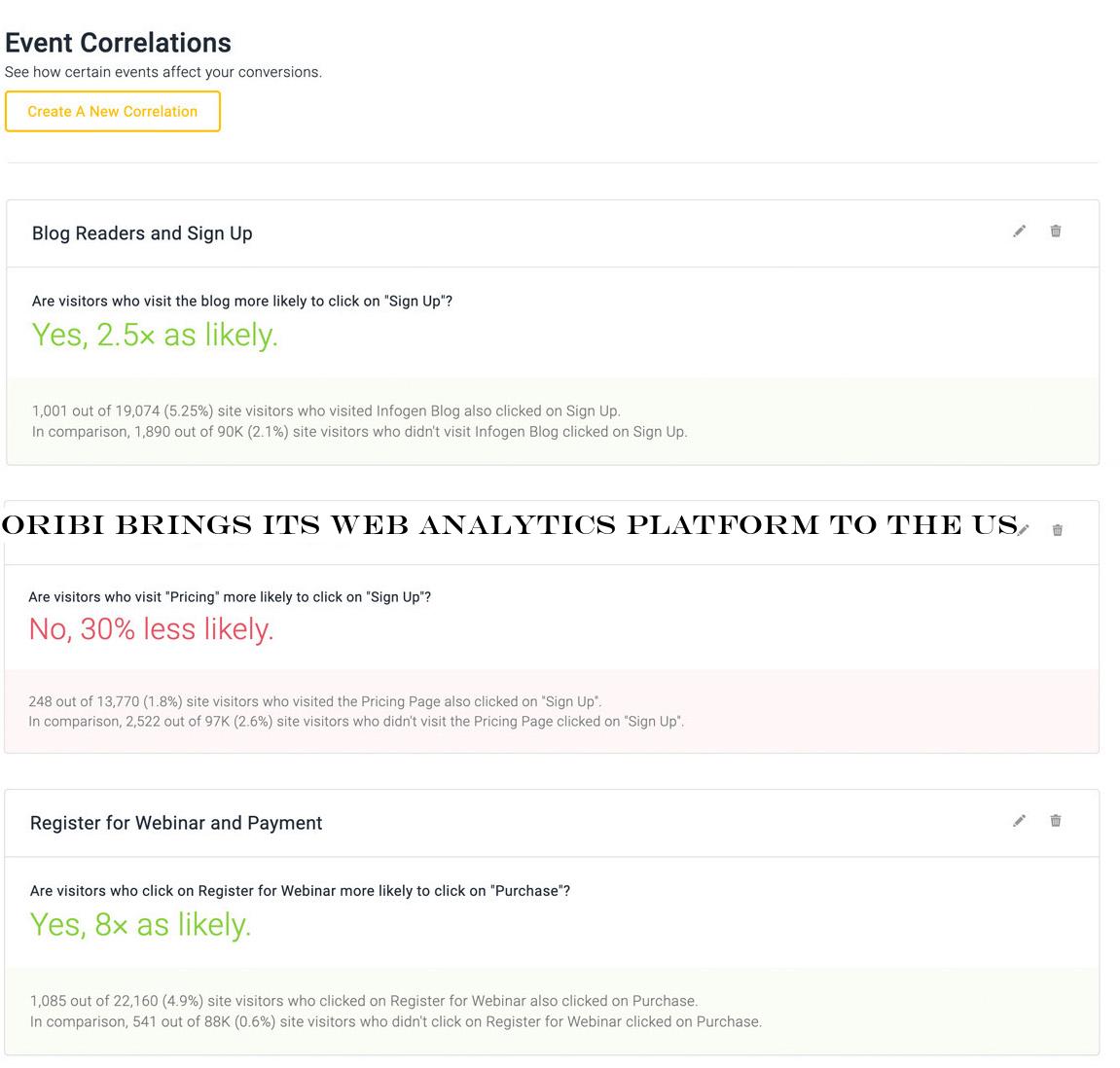
In fact, if you use Oribiplugins for platforms like WordPress and Shopify, thereno coding at all involved in the process. Apparently, thatbecause Oribi is already tracking every major event in the customer journey. It also allows the team to define the conversion goals that they want to focus on — again, with no coding required.
Shoor contrasted Oribi with analytics platforms that simply provide &more and more data& but don&t help customers understand what to do with that data.
&We&ve created something that is much more clean,& she said. &We give them insights of whatworking; in the background, we create all these different queries and correlations about which part of the funnels are broken and where they can optimize.&
There are big businesses using Oribi already — including Audi, Sony and Crowne Plaza — but the company is now turning its attention to U.S. customers. Shoor said Oribi isn&t opening an office in the United States right away, but there are plans to do so in the next year.
- Details
- Category: Technology Today
Read more: Oribi brings its web analytics platform to the US
Write comment (98 Comments)While some gig economy companies have already taken steps to try to prevent the spread of COVID-19 among its workers, Sen. Mark Warner (VA) is encouraging them to go further and consider ensuring workers don&t face financial consequences as a result of the virus.
&I strongly urge that you attempt to address the potential financial hardship for your workers if they are sick or have to self-quarantine during this time,& he wrote. &In order to limit the spread of COVID-19, it is critical that platform companies lead by example by committing that economic uncertainty will not be deterrents to their workers following public health guidance during the response.&
In separate letters to Uber, Lyft, Instacart, Postmates, Grubhub and DoorDash, Sen. Warner laid out a couple of ideas. The first entails creating a special coronavirus health fund that would be available to gig workers if they need to take time off to get tested or self-quarantine. The other idea is to pay workers their regular average pay, even if they can&t work their normal average hours.
&A health emergency for which they bear no responsibility should not place an undue financial burden on workers and their families,& he wrote.
Uber, in a statement to TechCrunch, said it is exploring options to compensate drivers who may be affected.
&We have a dedicated global team, guided by the advice of a consulting public health expert and public health organizations, working to respond as needed in each market where we operate around the world,& an Uber spokesperson said. &This team is also exploring compensation for drivers who have been quarantined or diagnosed with coronavirus, whether independently, through a fund, or in partnership with peer companies. We will keep the Senator updated about our plans and will respond directly to his letter.&
In a statement, a Lyft spokesperson said the company appreciates Sen. Warnerleadership but did not explicitly mention potential compensation.
&We are focused on taking appropriate actions and are actively planning for multiple scenarios,& the Lyft spokesperson said. &We stand ready to coordinate with government officials.&
DoorDash, meanwhile, says it plans to engage in with Sen. Warner today about &innovative solutions& that help to enhance the welfare of DoorDashdelivery workers.
&DoorDashtask force is actively working to develop and implement a comprehensive strategy to protect the safety of our entire community in response to the spread of COVID-19,& a DoorDash spokesperson said. &We will continue to provide the latest public health guidance to consumers, Dashers, and merchants and remind our community in affected areas of the delivery instruction feature, enabling requests for food to be left at the door along with a photo of where the food should be left through the app.&
Postmates, which recently set up contactless delivery options, says it will continue to share information with its fleet of workers as the guidance from the Centers for Disease Control and Prevention evolves. Additionally, Postmates said it plans to brief Sen. Warneroffice with its plans to &invest in the well being of our flexible workforce.&
&Community health and safety is paramount at Postmates, and we continue to issue in-app, precautionary CDC guidance with those carrying out deliveries so that they are aware of the latest preventative measures,& a Postmates spokesperson said in a statement. &Postmates also announced today an option to designate drop-off of an item without contact; and we will continue to encourage employees, merchants, consumers, and all parts of our community to follow safety protocols such as washing hands and staying in if you are sick.&
GruhHub, similarily, also says itfocused on the health and safety of its drivers, customers and restaurant partners.
&We share Senator Warnerconcerns about the safety and welfare of our drivers and look forward to working with the Senator on these important issues,& a GrubHub spokesperson said in a statement,
This focus on the response of gig economy companies comes at a time when many of them are trying to combat a new California gig worker protection law, which would make it harder for these companies to classify workers as independent contractors. If classified as W-2 employees, they would have access to things like health care and paid time off.
Outside of the gig economy, companies like Microsoft and Facebook have been more proactive in this area. Microsoft, for example, has committed to paying hourly workers their regular wages even if they are unable to work as a result of COVID-19 concerns. Facebook, shortly after Microsoftannouncement, committed to paying its contingent workers who cannot work during this time of concern. SXSW has also just recently cancelled its conference.
TechCrunch has reached out to Instacart . We&ll update this story if we hear back.
- Details
- Category: Technology Today
Page 1285 of 1416

 12
12





